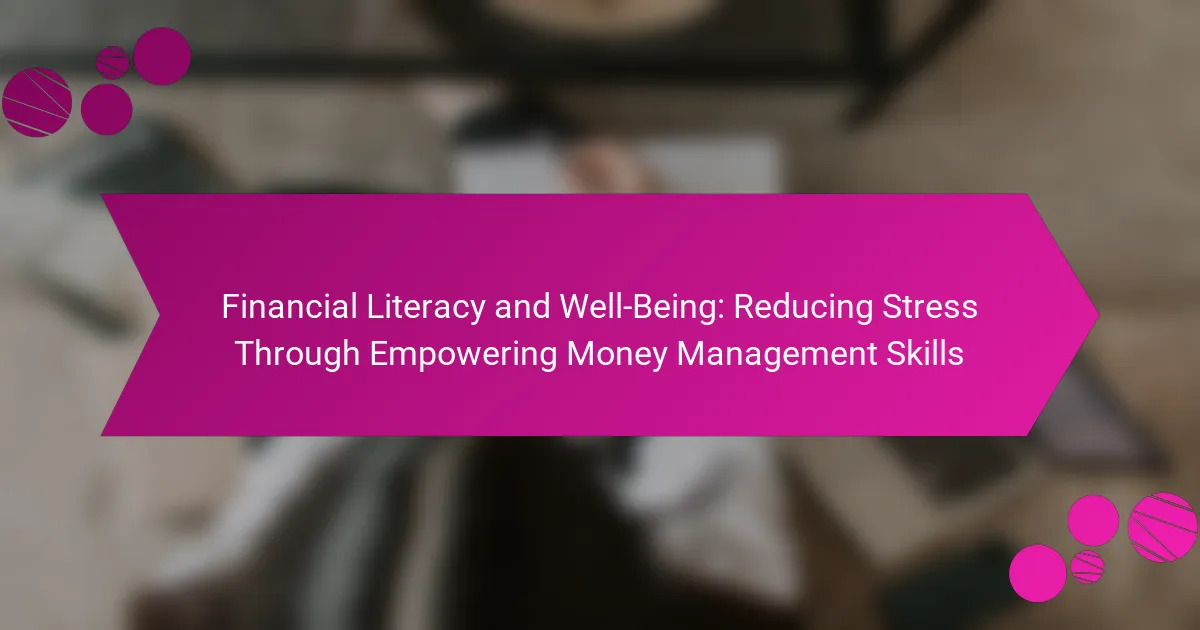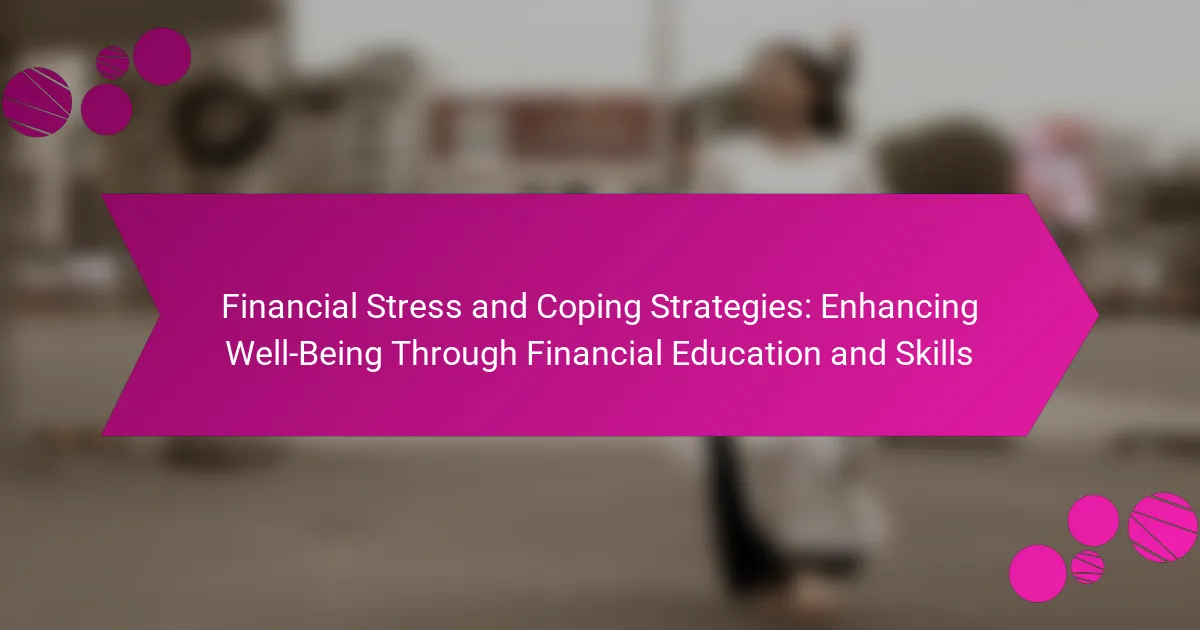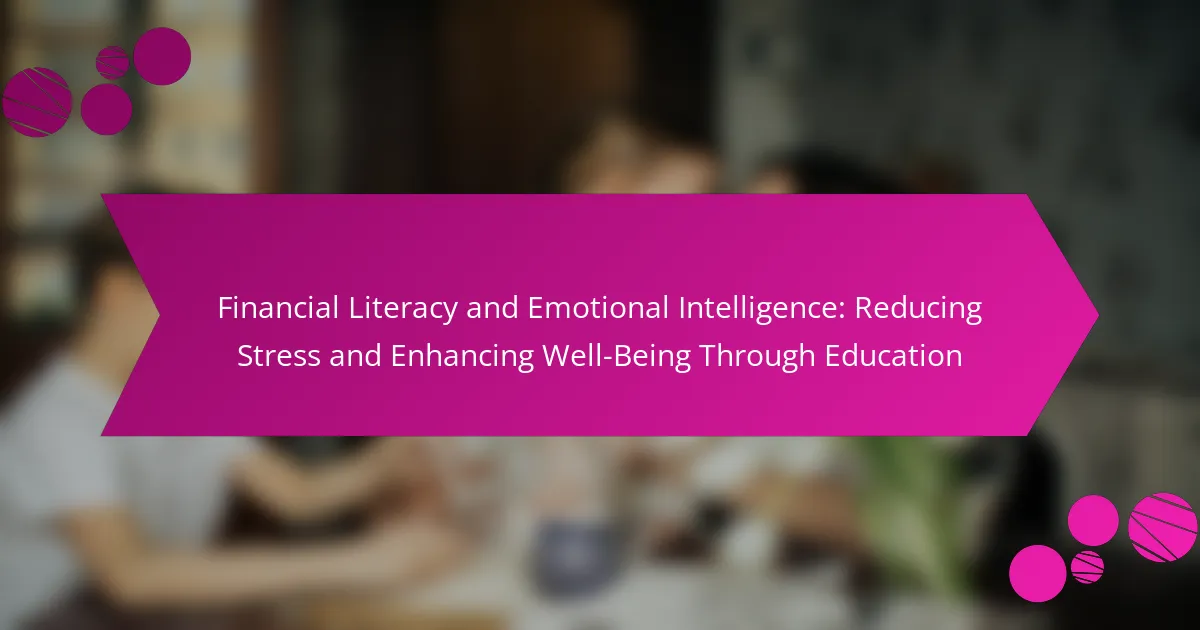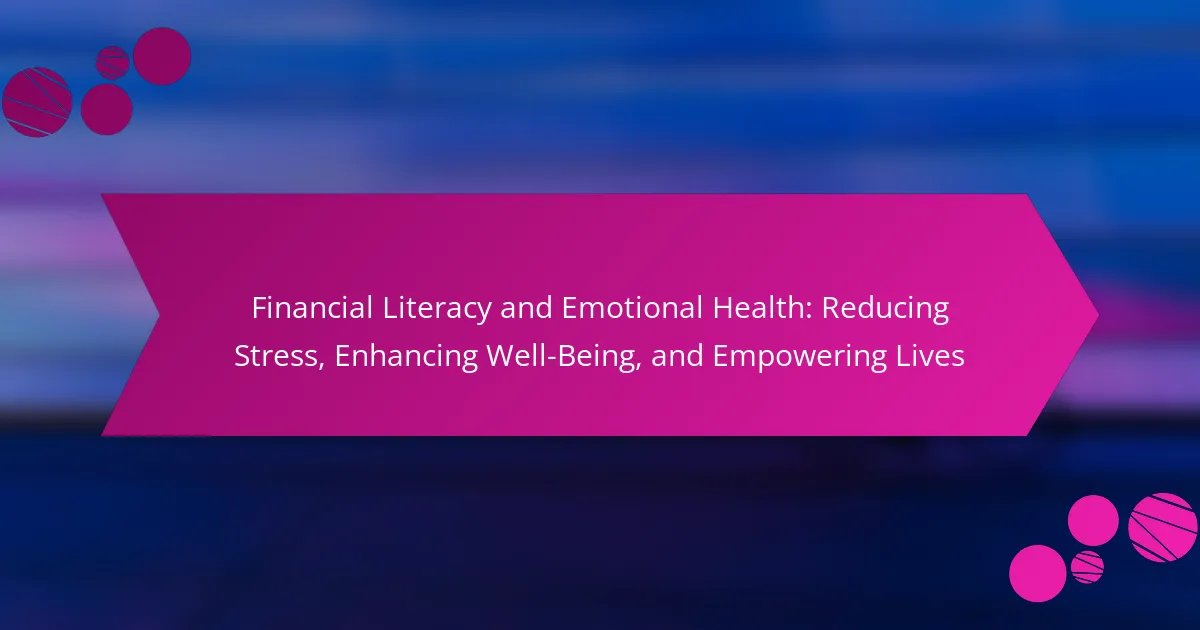Financial knowledge significantly reduces stress and enhances well-being. It empowers individuals to make informed decisions, leading to lower anxiety and greater life satisfaction. Understanding financial concepts fosters resilience in facing economic challenges. This article explores the relationship between financial education and mental health, highlighting its benefits for emotional stability and proactive stress management.
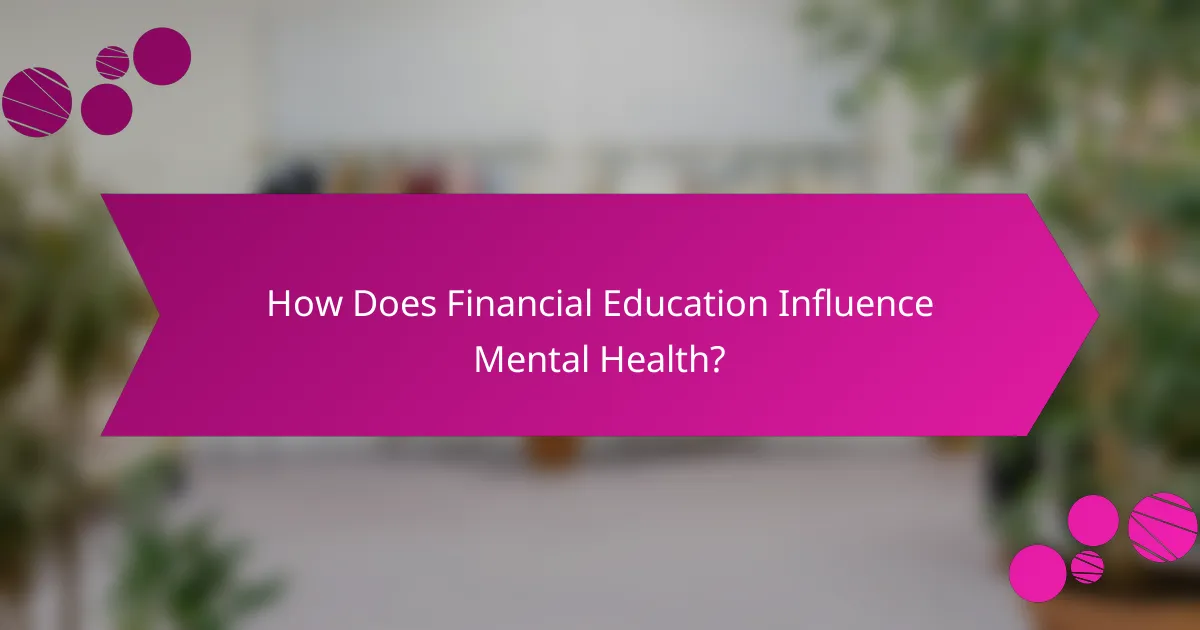
How Does Financial Education Influence Mental Health?
Financial education significantly influences mental health by reducing stress, enhancing well-being, and building resilience. Individuals with strong financial knowledge experience lower anxiety levels and improved emotional stability. Studies show that financial literacy correlates with better decision-making and increased confidence in managing personal finances. As a result, this empowerment fosters a positive mental state, allowing individuals to face financial challenges with resilience. Furthermore, understanding financial concepts helps mitigate the fear of unexpected expenses, promoting a sense of security and overall mental wellness.
What are the key components of financial education?
Financial education comprises essential components that enhance knowledge and mental health. Key components include budgeting skills, understanding credit, investment knowledge, and financial planning. These elements reduce financial stress, improve decision-making, and foster resilience. Effective financial education promotes well-being through informed choices and proactive management of resources.
In what ways can financial knowledge reduce stress?
Financial knowledge significantly reduces stress by empowering individuals to manage their finances effectively. Understanding budgeting, saving, and investing can alleviate anxiety related to financial uncertainty.
Additionally, financial literacy enhances decision-making, leading to better financial outcomes. For example, individuals with strong financial knowledge are more likely to avoid debt traps and plan for emergencies.
Research indicates that financial stress is a major contributor to mental health issues. By improving financial skills, individuals can build resilience against stressors, ultimately enhancing overall well-being.
Furthermore, the ability to set and achieve financial goals fosters a sense of control and stability, which is crucial for mental health. This proactive approach to finances creates a positive feedback loop, reinforcing confidence and reducing stress levels.
What specific financial skills contribute to lower anxiety levels?
Financial skills such as budgeting, saving, and investing contribute to lower anxiety levels. These skills enhance financial literacy, leading to better decision-making and increased confidence in managing personal finances. Effective budgeting allows individuals to track expenses and prioritize needs, reducing financial uncertainty. Saving establishes a safety net, providing peace of mind during emergencies. Investing fosters long-term growth, encouraging a proactive approach to financial health. Collectively, these skills build resilience, promoting mental well-being.
How does budgeting impact emotional well-being?
Budgeting significantly enhances emotional well-being by reducing financial stress and promoting a sense of control. Effective budgeting allows individuals to allocate resources wisely, leading to increased confidence in managing expenses. This control fosters resilience, as individuals feel better equipped to handle unexpected financial challenges. Studies show that people with strong budgeting skills report lower anxiety levels and greater overall satisfaction.
What role does financial literacy play in enhancing overall well-being?
Financial literacy significantly enhances overall well-being by reducing stress and fostering resilience. Individuals with strong financial knowledge can make informed decisions, leading to better financial stability. This stability contributes to lower anxiety levels associated with financial uncertainty. Furthermore, understanding financial concepts empowers individuals to plan for the future, enhancing their mental health and overall life satisfaction. Studies indicate that financially literate individuals report higher levels of happiness and lower levels of stress.
How can understanding investments improve life satisfaction?
Understanding investments significantly enhances life satisfaction by reducing financial stress and fostering a sense of control. Financial knowledge equips individuals with the skills to manage their resources effectively, leading to improved mental health and resilience. Research indicates that those with a solid grasp of investment principles report higher well-being and lower anxiety levels. By making informed decisions, individuals can cultivate a secure financial future, contributing to overall life satisfaction.
What is the relationship between savings and mental resilience?
Savings play a crucial role in enhancing mental resilience by reducing financial stress. When individuals have savings, they experience greater security and confidence in managing unexpected expenses. This financial buffer fosters a sense of control, which is essential for mental well-being. Studies show that individuals with savings report lower anxiety levels and improved overall health. Additionally, having financial knowledge empowers individuals to make informed decisions, further strengthening their resilience against stressors.

What unique benefits does financial education provide for mental health?
Financial education uniquely benefits mental health by reducing financial stress, enhancing overall well-being, and building resilience. Improved financial literacy leads to better decision-making, which decreases anxiety related to money management. Studies show that individuals with financial knowledge report lower levels of stress and greater life satisfaction. Additionally, understanding financial concepts empowers individuals to plan for the future, fostering a sense of control that positively impacts mental health.
How does financial confidence affect personal relationships?
Financial confidence significantly enhances personal relationships by reducing stress and fostering open communication. Individuals with sound financial knowledge experience lower anxiety levels, which positively impacts their interactions with partners and family members. Financial stability promotes trust, as partners feel secure in their future together. Consequently, this confidence cultivates resilience, enabling couples to navigate financial challenges collaboratively. Studies indicate that financial issues are a leading cause of relationship strain, highlighting the importance of financial literacy in maintaining healthy connections.
What unique stressors can financial education alleviate?
Financial education can alleviate unique stressors such as financial anxiety, uncertainty about future expenses, and feelings of inadequacy in managing personal finances. By enhancing financial literacy, individuals gain confidence in budgeting, saving, and investing, which reduces stress levels. Improved financial knowledge also fosters resilience, enabling individuals to navigate economic challenges more effectively. Studies show that financial education correlates with lower levels of stress and improved overall mental health.

What rare attributes of financial education contribute to well-being?
Financial education enhances well-being through unique attributes like financial confidence, informed decision-making, and proactive stress management. These attributes reduce anxiety related to financial uncertainty, fostering resilience. Studies show that individuals with strong financial knowledge report higher life satisfaction and lower stress levels, significantly impacting mental health.
How can financial education foster community support?
Financial education fosters community support by enhancing financial literacy, which reduces stress and improves mental well-being. Communities with higher financial knowledge experience increased resilience and collaboration. Empowered individuals contribute to collective stability, creating a supportive environment. Research indicates that financial literacy programs can lead to a 20% reduction in financial stress among participants, enhancing overall community health.
What innovative programs are emerging in financial education?
Innovative programs in financial education focus on integrating mental health strategies to enhance well-being. These initiatives aim to reduce financial stress and build resilience. Programs like financial therapy combine financial planning with psychological support, addressing the emotional aspects of money management. Additionally, workshops that promote mindfulness and budgeting skills help individuals develop healthier financial habits. Research shows that improving financial literacy can significantly lower anxiety levels related to financial issues, fostering a more positive outlook on personal finance.
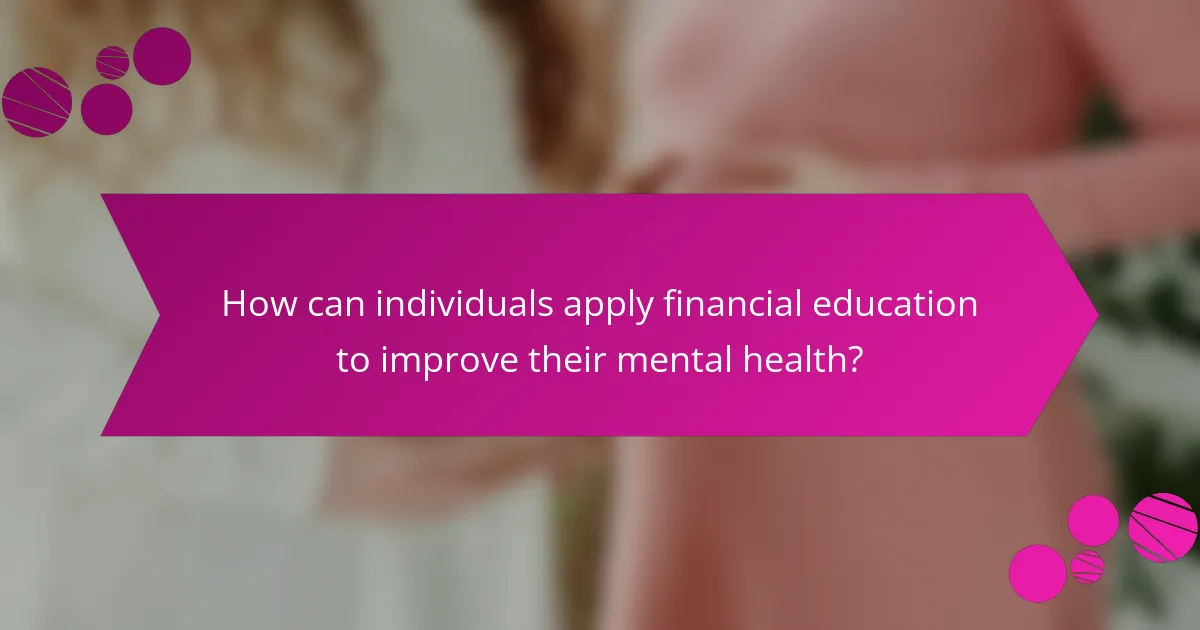
How can individuals apply financial education to improve their mental health?
Individuals can apply financial education to improve their mental health by reducing stress and enhancing overall well-being. Understanding personal finance helps individuals manage their budgets, leading to decreased anxiety about money. Knowledge of financial planning promotes resilience, allowing individuals to navigate economic challenges more effectively. For example, creating an emergency fund can provide a sense of security, reducing mental strain. Additionally, financial literacy empowers individuals to make informed decisions, fostering confidence and reducing feelings of helplessness. Ultimately, integrating financial education into daily life can significantly enhance mental health and emotional stability.
What best practices should be adopted for financial literacy?
To enhance financial literacy, adopt practices that integrate knowledge with mental health strategies. Prioritise budgeting and savings education, as these reduce financial stress and enhance well-being. Engage in regular financial assessments to build resilience. Utilise community resources for workshops and support groups, fostering a collaborative learning environment. Incorporate mindfulness techniques to manage anxiety related to financial decisions.
What common mistakes hinder effective financial education?
Common mistakes that hinder effective financial education include a lack of personalised approaches, oversimplification of complex concepts, and neglecting emotional aspects of financial decision-making. These mistakes can lead to increased stress and hinder overall well-being. For example, one-size-fits-all strategies often fail to address individual circumstances, which can exacerbate anxiety related to finances. Additionally, ignoring mental health factors can prevent individuals from fully engaging with financial education, ultimately limiting their resilience in managing financial challenges.
How can one cultivate a resilient financial mindset?
To cultivate a resilient financial mindset, focus on enhancing financial knowledge and emotional well-being. Start by educating yourself on budgeting, saving, and investing. This knowledge reduces stress and builds confidence in managing finances. Develop emotional awareness to recognise how financial situations affect mental health. Establish a support system to share experiences and strategies. Practice mindfulness techniques to alleviate anxiety related to financial pressures. Regularly review and adjust financial goals to adapt to changing circumstances, fostering resilience.
